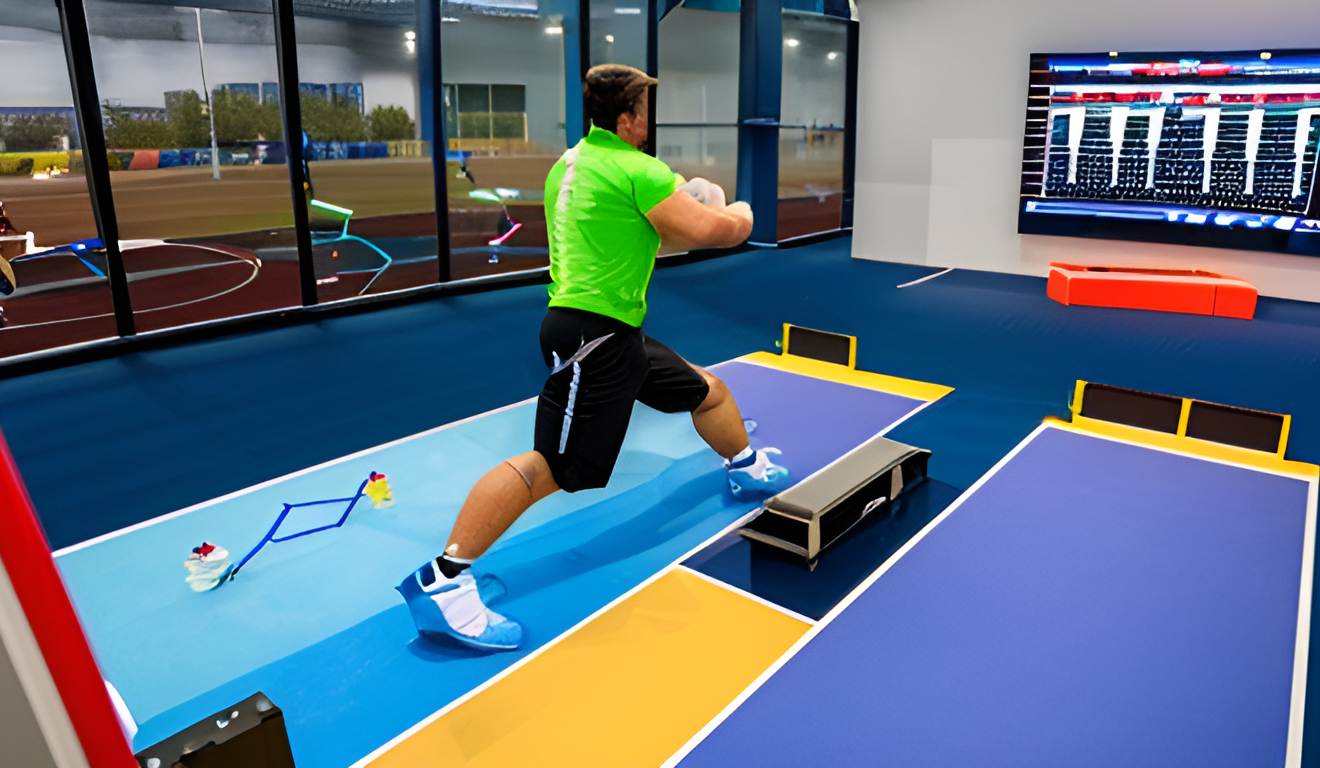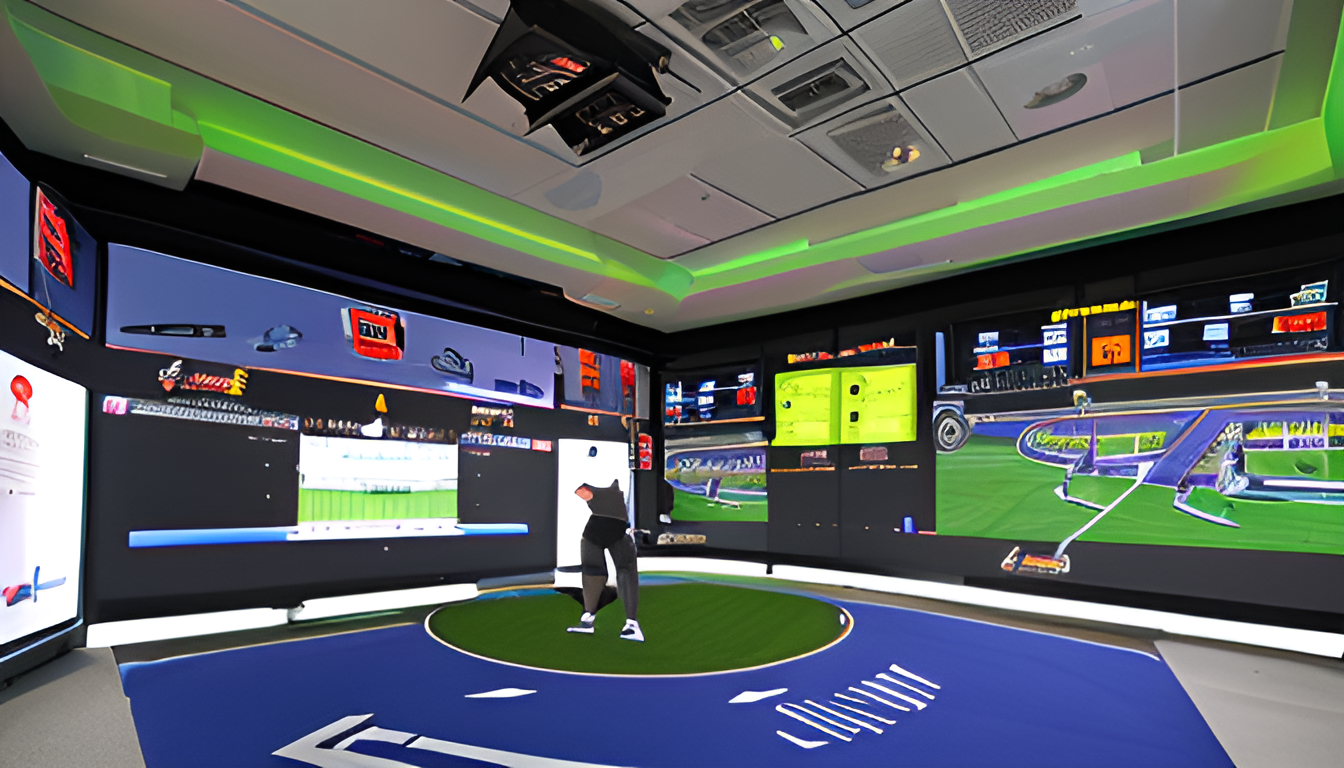AI in Olympic Training: Enhancing Athletic Performance

In the world of sports, the quest for excellence is relentless. Athletes are constantly pushing their limits, seeking that elusive edge that can propel them to victory. Enter artificial intelligence (AI), a game-changer in Olympic training that is not just enhancing athletic performance but also revolutionizing the entire training process. Imagine having a virtual coach that analyzes every aspect of your performance, from your speed to your recovery times. Sounds futuristic, right? Well, it’s happening now!
AI is transforming how athletes train by providing data-driven insights that allow for tailored training regimens. Coaches can now dissect performance metrics with pinpoint accuracy, making adjustments that were once based on intuition. This means that every sprint, jump, and lift is analyzed to optimize the athlete’s performance. For instance, if an athlete is struggling with their sprinting technique, AI can identify the specific areas that need improvement, enabling targeted training that maximizes efficiency.
Moreover, the integration of machine learning algorithms into training programs is a game changer. These algorithms adapt to the unique needs of each athlete, focusing on their strengths and addressing weaknesses. It’s like having a personal trainer who knows you inside out. This personalized approach not only enhances performance but also builds confidence, allowing athletes to focus on what they do best.
But it doesn’t stop there. AI also plays a pivotal role in injury prevention. By analyzing training loads and biomechanics, AI systems can predict potential injuries before they happen. This predictive capability is crucial, especially during the rigorous training periods leading up to the Olympics. Athletes can adjust their routines based on AI recommendations, ultimately preserving their health and ensuring peak performance when it matters the most.
As we look ahead, the future of AI in Olympic training is bright. With continuous advancements in technology, athletes will have access to even more sophisticated tools that can redefine the boundaries of human performance. The integration of AI is not just a trend; it is a fundamental shift in how sports are approached at the highest level, paving the way for a new era of athletic excellence.
The Role of AI in Athlete Performance Analysis
In the fast-paced world of sports, every second counts, and athletes are always on the lookout for an edge. Enter artificial intelligence (AI), a game changer that is revolutionizing the way we analyze athlete performance. By harnessing the power of AI technologies, coaches and trainers can now dive deep into performance metrics, uncovering insights that were once hidden beneath the surface. Imagine having a virtual coach that can sift through mountains of data to pinpoint exactly what an athlete needs to improve. It’s like having a personal trainer who never sleeps!
AI algorithms can analyze various performance indicators, such as speed, strength, agility, and endurance, providing a comprehensive overview of an athlete’s capabilities. For instance, consider the following key metrics that AI can evaluate:
- Heart Rate Variability
- Movement Patterns
- Biomechanical Efficiency
- Recovery Times
With this wealth of information, coaches can tailor training regimens that are not only effective but also efficient. For example, if an athlete’s data shows a decline in speed during specific drills, the coach can adjust the training plan to focus on speed-enhancing exercises. This targeted approach not only saves time but also maximizes the potential for improvement.
Moreover, AI doesn’t just stop at performance metrics; it also plays a crucial role in identifying patterns and predicting outcomes. By analyzing historical data, AI can forecast how an athlete might perform under different conditions, helping coaches strategize better for competitions. This predictive capability is akin to having a crystal ball that can guide athletes through their training journey.
In summary, the integration of AI into athlete performance analysis is not just a trend; it’s a fundamental shift in how sports training is approached. With the ability to provide real-time insights and personalized feedback, AI is setting a new standard for excellence in athletic performance.
Personalized Training Programs Through Machine Learning
Imagine stepping into the training arena, where every drill, every sprint, and every lift is tailored just for you. Machine learning is making this a reality for athletes across the globe, creating personalized training programs that adapt to individual needs like a chameleon in its environment. This innovative approach not only enhances strengths but also addresses weaknesses, ensuring that every athlete is primed for peak performance when it matters most.
At its core, machine learning analyzes vast amounts of data collected from various sources, including performance metrics, historical results, and even biometric information. By leveraging this data, coaches can develop training regimens that are as unique as the athletes themselves. For instance, an athlete who excels in endurance but struggles with speed can receive a program that focuses on sprinting techniques while still incorporating endurance training. This kind of customization is revolutionary, as it allows athletes to maximize their potential without wasting time on ineffective drills.
Furthermore, the beauty of machine learning lies in its ability to continuously learn and adapt. As athletes progress and their needs change, the training programs evolve accordingly. This dynamic nature means that athletes are always challenged, preventing plateauing and keeping motivation high. Just like a skilled chef who adjusts the recipe based on the ingredients available, machine learning ensures that athletes are always getting the best possible training experience.
To illustrate the effectiveness of machine learning in crafting personalized training programs, consider the following table:
| Athlete Type | Focus Areas | Training Adjustments |
|---|---|---|
| Sprinter | Speed, Power | Increased sprint drills, plyometrics |
| Marathon Runner | Endurance, Stamina | Long-distance runs, interval training |
| Weightlifter | Strength, Technique | Heavy lifts, technique refinement |
In conclusion, the integration of machine learning into Olympic training is not just a trend; it’s a significant leap forward in how athletes prepare for competition. By creating personalized training programs that adapt to the individual, athletes can achieve their goals more efficiently and effectively. So, the next time you see an Olympic athlete on the podium, remember that behind their success lies a sophisticated web of data-driven training strategies that are reshaping the landscape of sports.
Data-Driven Decision Making in Coaching
In today’s fast-paced sports environment, the reliance on data-driven insights has become a game-changer for coaches. Imagine a world where every decision made about an athlete’s training, recovery, and competition strategy is backed by solid data. This isn’t just a dream; it’s the reality that artificial intelligence (AI) brings to the table. Coaches can now analyze vast amounts of performance metrics, allowing them to tailor training schedules that align perfectly with each athlete’s needs.
With the help of AI, coaches can identify patterns in performance data that were previously invisible. For instance, if an athlete consistently performs better at certain times of the day, this insight can lead to optimized training schedules. By analyzing factors such as heart rate, fatigue levels, and even sleep quality, coaches can make informed decisions that enhance performance. This data-driven approach not only improves training efficacy but also boosts athletes’ confidence as they see real-time results from their efforts.
Moreover, AI tools offer predictive analytics, which can forecast how an athlete might perform under varying conditions. By simulating different scenarios, coaches can devise strategies that prepare athletes for any challenge they might face during competitions. This means that when the pressure is on, athletes can rely on a game plan that has been meticulously crafted based on data, rather than guesswork.
To illustrate this further, consider the following table that highlights key aspects of data-driven decision-making in coaching:
| Aspect | Description |
|---|---|
| Performance Metrics | Data collected on speed, endurance, and technique during training sessions. |
| Recovery Analysis | Insights on optimal rest periods and recovery techniques based on athlete performance. |
| Injury Prediction | Using historical data to forecast potential injury risks and adjust training loads. |
In conclusion, the integration of AI in coaching is revolutionizing how decisions are made. With data at their fingertips, coaches can enhance athlete performance like never before, making the training process not just smarter but also more efficient. The future of coaching is bright, and it’s driven by data!
Real-Time Feedback Mechanisms
In the fast-paced world of Olympic training, are revolutionizing how athletes refine their skills. Imagine an athlete sprinting down the track, their coach providing instant feedback through an AI-enabled device. This technology captures data on speed, form, and posture, allowing athletes to make immediate adjustments. It’s like having a personal coach in your pocket, guiding you every step of the way!
These innovative tools not only enhance performance but also boost an athlete’s confidence. When athletes receive immediate insights on their techniques, they can correct mistakes on the fly. For instance, if a swimmer’s stroke is off, they can adjust their movements during practice rather than waiting for a post-session analysis. This immediacy can be the difference between a medal and a missed opportunity.
Furthermore, real-time feedback can be tailored to each athlete’s needs. Coaches can input specific goals into the system, and the AI will analyze performance against these benchmarks. This personalized approach ensures that training is always relevant and focused. For instance, a table summarizing key performance indicators (KPIs) might look like this:
| Performance Metric | Real-Time Data | Suggested Adjustment |
|---|---|---|
| Speed | 12.5 m/s | Increase stride length |
| Heart Rate | 150 bpm | Reduce intensity |
| Technique Score | 85% | Focus on arm positioning |
Ultimately, the integration of real-time feedback mechanisms into training regimens is a game changer. Athletes can analyze their performance as it happens, leading to improved outcomes and a more efficient training process. With AI by their side, the path to Olympic glory becomes clearer and more achievable.
Injury Prevention Strategies
In the world of athletics, where every second counts and every movement matters, injury prevention has become a top priority for athletes and coaches alike. With the integration of artificial intelligence into training regimens, we are witnessing a revolutionary shift in how injuries are anticipated and avoided. By utilizing AI systems, coaches can analyze an athlete’s training loads, biomechanics, and even physiological responses to identify potential risks before they escalate into serious injuries.
Imagine having a personal coach that never sleeps, constantly monitoring your every move and suggesting adjustments in real-time. This is precisely what AI technology offers. By collecting and analyzing vast amounts of data, these systems can predict when an athlete might be overexerting themselves. For instance, if an athlete’s training intensity spikes too quickly, the AI can alert the coach to modify the training plan, ensuring that the athlete remains at peak performance without crossing the line into injury territory.
Moreover, AI can assess biomechanical patterns during training sessions. By using advanced motion capture technology, it can evaluate how an athlete moves and identify any irregularities that could lead to injuries. For example, if an athlete’s running form is slightly off, the AI can provide feedback, allowing for immediate corrections. This not only helps in enhancing performance but also plays a crucial role in maintaining the athlete’s health.
Additionally, the integration of AI in monitoring recovery protocols is essential. Athletes often push their limits; however, without adequate recovery, the risk of injury increases significantly. AI can help create personalized recovery plans based on an athlete’s specific needs, ensuring they get the right balance of rest, nutrition, and rehabilitation. This tailored approach is vital in maintaining long-term athletic health.
In summary, the future of injury prevention in sports is undeniably tied to artificial intelligence. With its ability to provide real-time feedback, analyze biomechanical data, and optimize recovery strategies, AI is setting a new standard for how athletes prepare for competition while safeguarding their physical well-being.
Enhancing Mental Preparation with AI
In the high-stakes world of Olympic sports, mental preparation is just as crucial as physical training. Athletes often face immense pressure, and the ability to maintain focus and composure can make all the difference in their performance. This is where artificial intelligence steps in, providing innovative solutions to enhance mental conditioning.
AI applications are being developed to assist athletes in various aspects of mental preparation. For instance, these technologies can analyze an athlete’s emotional responses during training and competitions, offering insights that help them understand their mental state better. By identifying patterns in stress and anxiety levels, athletes can work on strategies to manage these feelings effectively.
Moreover, AI-driven platforms can provide personalized mental training programs tailored to individual needs. These programs may include:
- Guided meditation sessions to promote relaxation.
- Visualization techniques that help athletes imagine successful performances.
- Breathing exercises to reduce anxiety before competitions.
Real-time feedback is another way AI is revolutionizing mental preparation. Imagine an athlete receiving instant notifications about their stress levels during practice. This immediate data allows them to implement calming techniques on the spot, which can be a game-changer during high-pressure situations.
In addition, AI can facilitate peer support networks among athletes, connecting them with others who have faced similar challenges. These networks can provide a platform for sharing experiences, coping strategies, and motivation, fostering a sense of community that is essential for mental resilience.
As technology continues to evolve, the integration of AI into mental preparation will likely deepen, paving the way for more advanced tools and techniques that empower athletes to achieve their peak performance, both physically and mentally. The future is bright, and with AI at their side, athletes can face the Olympic stage with confidence and clarity.
AI in Nutrition and Recovery
In the world of sports, nutrition is just as crucial as training. Athletes need to fuel their bodies with the right nutrients to perform at their best, and this is where artificial intelligence steps in to revolutionize the game. AI technologies are now being harnessed to create personalized meal plans that cater to the unique needs of each athlete. Imagine having a virtual nutritionist that knows your body inside and out, adjusting your diet based on your training intensity, recovery needs, and even your metabolic responses!
AI algorithms analyze vast amounts of data, including an athlete’s performance metrics, dietary preferences, and recovery patterns, to optimize meal timing and nutrient intake. For instance, an athlete preparing for an event may require a different nutritional strategy compared to someone in the off-season. By utilizing AI, coaches can ensure that their athletes are not only eating the right foods but also at the right times. This can lead to improved energy levels, enhanced recovery, and ultimately, better performance on the field.
Moreover, AI can help in developing recovery protocols that are tailored to individual athletes. After an intense training session, knowing how to recover effectively is vital. AI systems can suggest specific recovery strategies based on real-time data, such as heart rate variability and muscle soreness levels. This personalized approach can include recommendations for hydration, rest, and even specific recovery exercises.
To illustrate the impact of AI in nutrition and recovery, consider the following table that highlights key areas where AI is making a difference:
| Aspect | AI Contribution |
|---|---|
| Meal Planning | Customized meal plans based on individual needs and training schedules. |
| Nutrient Timing | Optimizing when to consume specific nutrients for maximum benefit. |
| Recovery Strategies | Personalized recovery protocols based on real-time performance data. |
| Hydration Monitoring | AI-driven hydration recommendations based on activity levels. |
In conclusion, AI is not just a tool; it’s a game-changer in the realm of nutrition and recovery for athletes. By leveraging data and technology, athletes can achieve a level of performance that was previously unimaginable, ensuring they are always at the top of their game when it matters most.
Smart Wearables and Performance Tracking
In the fast-paced world of sports, smart wearables have emerged as game-changers, revolutionizing how athletes track their performance and optimize their training. Imagine having a personal coach right on your wrist, constantly monitoring your every move. That’s the power of technology today! These devices are equipped with advanced sensors that collect a wealth of data, from heart rate and body temperature to movement patterns and even sleep quality.
What makes these wearables truly remarkable is their ability to provide real-time insights. Athletes can receive instant feedback during training sessions, allowing them to make immediate adjustments to their techniques. For instance, if a runner’s form begins to falter, their wearable can alert them to correct their posture, preventing potential injuries and enhancing performance. It’s like having a second pair of eyes, ensuring every training session is as effective as possible.
Moreover, the data collected from these devices can be analyzed to identify trends over time. Coaches can utilize this information to tailor training programs specifically to an athlete’s needs. For example, if an athlete consistently shows signs of fatigue during certain drills, adjustments can be made to their training load. This level of personalization is invaluable in preparing for high-stakes competitions like the Olympics.
Here’s a quick look at some of the benefits of smart wearables:
- Continuous Monitoring: Track vital signs and performance metrics in real time.
- Data-Driven Adjustments: Make informed decisions based on collected data.
- Enhanced Recovery: Monitor recovery metrics to optimize rest periods.
As we look to the future, the integration of AI with smart wearables promises even greater advancements. Imagine wearables that not only track performance but also predict outcomes based on historical data. The potential is limitless, and athletes who embrace these technologies will undoubtedly have a competitive edge on the road to Olympic glory.
Case Studies of AI Success in Sports
When we dive into the world of sports, it’s fascinating to see how artificial intelligence is not just a buzzword but a game changer. Take, for example, the renowned Australian Institute of Sport (AIS), which has harnessed AI to enhance athlete performance. By analyzing data from various sources, AIS has created a comprehensive performance profile for each athlete. This profile helps coaches tailor training specifically to the athlete’s needs, resulting in remarkable improvements.
Another standout case is the NBA, where teams like the Golden State Warriors have integrated AI-driven analytics to optimize player performance. By utilizing AI algorithms, they can analyze players’ movements and decision-making processes in real time. This data allows coaches to make informed decisions about player rotations and strategies, ensuring that every game is played at peak efficiency.
Moreover, Olympic sprinter Usain Bolt has also benefited from AI technology. His training regimen included advanced motion capture systems that provided real-time feedback on his running technique. This enabled him to make immediate adjustments, ultimately contributing to his world-record-breaking performances. Imagine the impact of having instant insights during training sessions—it’s like having a personal coach available 24/7!
To further illustrate the impact of AI, consider the following table showcasing some successful AI implementations in sports:
| Sport | AI Application | Outcome |
|---|---|---|
| Basketball | Player performance analytics | Improved game strategies |
| Athletics | Motion analysis | Enhanced running techniques |
| Soccer | Injury prediction | Reduced injury rates |
These case studies clearly demonstrate the transformative power of AI in sports. By leveraging data and technology, athletes and coaches can make smarter decisions, ultimately leading to better performance on the world stage. As we look ahead, it’s exciting to think about how AI will continue to shape the future of athletic training and competition.

The Future of AI in Sports Training
As we look ahead, the future of AI in sports training is not just bright; it’s dazzling! Imagine a world where every athlete has a personal AI coach, analyzing their every move, providing instant feedback, and tailoring training to their unique needs. This isn’t science fiction; it’s rapidly becoming our reality. The integration of AI is set to revolutionize how athletes prepare, compete, and recover.
One of the most exciting prospects is the development of advanced predictive analytics. These tools will allow coaches to foresee how an athlete’s body will respond to various training loads, potentially preventing injuries before they happen. This proactive approach to training means athletes can focus on performance rather than recovery, leading to enhanced competition readiness.
Moreover, as machine learning algorithms become increasingly sophisticated, they will be able to analyze vast amounts of data from multiple sources, including wearable technology and performance metrics. This data can be synthesized to create hyper-personalized training programs that evolve in real-time based on the athlete’s progress. Imagine a training regimen that adapts daily, ensuring that an athlete is always pushing their limits without overextending themselves.
Furthermore, we can expect a surge in virtual reality (VR) and augmented reality (AR)
In summary, the future of AI in sports training is poised to bring about unprecedented changes. With the potential for real-time analytics, personalized training, and immersive technologies, athletes will be better equipped than ever to reach their peak performance. As we embrace these innovations, we stand on the brink of a new era in sports training, where the possibilities are limited only by our imagination.
Frequently Asked Questions
- How does AI enhance athletic performance?
AI enhances athletic performance by analyzing performance metrics, enabling personalized training programs, and providing real-time feedback. This helps athletes optimize their training routines and improve their overall efficiency.
- What role does machine learning play in Olympic training?
Machine learning plays a crucial role by creating customized training plans that adapt to each athlete’s unique strengths and weaknesses. This tailored approach maximizes their potential and prepares them effectively for competitions.
- Can AI help in injury prevention?
Absolutely! AI systems analyze training loads and biomechanics to predict potential injuries, allowing athletes to adjust their routines proactively and avoid setbacks during critical training periods.
- How does AI contribute to mental preparation?
AI assists athletes in mental conditioning by offering techniques to improve focus, reduce anxiety, and build mental resilience. This mental edge can be just as important as physical training in high-stakes competitions.
- What is the significance of nutrition in AI-driven training?
Nutrition is vital for optimal performance, and AI can optimize meal plans and recovery protocols. This ensures athletes receive the right nutrients at the right times, which is essential for peak performance during competitions.
- Are there real-world examples of AI success in sports?
Yes! Numerous case studies showcase how AI has been integrated into training regimens, leading to significant improvements in athlete performance and preparation for Olympic events. These examples highlight the tangible benefits of AI in sports.
- What does the future hold for AI in sports training?
The future of AI in sports training looks promising, with ongoing technological advancements that could further enhance athlete performance and redefine training methodologies in the Olympic arena.













